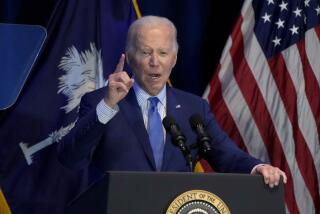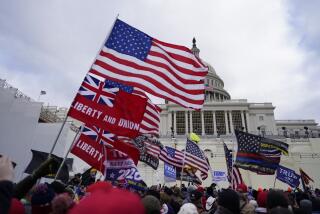Trump begins Year 3 in a deep hole
President Trump begins his third year in office in a deep hole.
Monday marks the second anniversary of Trump’s inauguration. He began that day with record levels of public disapproval for a new president. Since then, public doubts have deepened and hardened.
That doesn’t mean Trump can’t win reelection. Ronald Reagan and Bill Clinton both hit low points in public approval similar to Trump’s and rebounded to win second terms.
Both had advantages Trump lacks, however, making the task the current president faces that much harder. New polls from several major, nonpartisan survey organizations detail the extent of the problem he faces.
Sign up to get the Essential Politics newsletter in your inbox every week »
Sustained unpopularity
What makes the public disapproval of Trump so notable is consistency. He has had small ups and downs, but unlike any of his five predecessors, he has never won majority approval.
Currently, his standing has sunk toward the bottom of its two-year range. In a new survey from the nonpartisan Pew Research Center, just 37% of Americans approved of Trump’s job performance; 59% disapproved. None of the past five presidents faced a deficit so large.
Pew’s numbers aren’t alone. Polls over the last few weeks by 10 major survey organizations showed a tight range of approval figures, from 37% to 45%.
The approval number, however, isn’t the most troubling for Trump. It has changed very little during his presidency: His core supporters like him, most of the rest of the country doesn’t, and a very small segment shifts up or down at any given point.
The current figure is no doubt depressed somewhat by the unpopular partial shutdown of the government, which enters its fifth week on Saturday with a growing round of tit-for-tat retaliations between the president and House Speaker Nancy Pelosi.
What has changed are voter views of Trump on other qualities, including honesty and competence. None of the movement is favorable.
In the Pew survey, for example, almost six-in-10 Americans, 58%, say they trust what Trump says less than they trusted what previous presidents said in office. That’s steadily worsened since he took office.
That question provides a good measure of the size of Trump’s core support: 26% say they have more confidence in his statements than those of previous presidents.
The Pew survey was conducted Jan. 9-14 among 1,505 American adults. The margin of error for the full sample is 3 percentage points in either direction.
Members of Congress in both parties share that lack of trust in what Trump says. As Noah Bierman wrote, that absence of credibility now severely hampers Trump’s ability to make legislative deals.
By 53% to 44%, the Pew survey found Americans lack confidence in Trump’s ability to “use military force wisely.” By 62% to 35%, they doubt his ability to “work effectively with Congress.”
And fewer than three-in-10 Americans, 28%, say they have full confidence that Trump “keeps his own business interests separate from the decisions he makes as president.” Well over half, 57%, say they lack confidence that he does so.
Only 39% of Americans rate the ethics of Trump’s appointees as good, Pew found. That’s the lowest measure by far of any administration going back to the 1980s.
Although that and other questions show a predictable partisan divide, notably only 16% of Republicans describe the ethics of Trump’s appointees as “excellent.”
A steep comeback trail
Voters can, of course, decide to reelect a person they disapprove of if they view the challenger as worse. In 2016, many voters who cast ballots for Trump disapproved of him.
For that reason, job approval doesn’t provide a precise election forecast. The two measures have a lot in common, however.
Trump won two years ago while losing the popular vote. That’s a difficult trick that involved lucky flukes. His position has deteriorated since then, and his current numbers put him far closer to candidates like George McGovern, who took 38% of the vote in 1972, or Walter Mondale, who lost with 41% in 1984, than to the successful presidents who defeated them.
Still, that’s not the end of the story. Reagan’s approval at the end of Year 2 was no better than Trump’s is now, yet he won reelection in a landslide. Clinton, too, rebounded after a dismal first two years.
So Trump has a path forward.
He has maintained the loyalty of his base, although signs abound of fraying around the edges, as Eli Stokols found when he spoke with farmers at Trump’s speech this week to the American Farm Bureau Federation.
He needs more than the base to win, however, and gaining those votes likely involves a much steeper climb than either Reagan’s or Clinton’s. Partisan lines have hardened considerably since the 1980s and 1990s, draining the pool of swing voters. More importantly, Reagan and Clinton benefited from steady economic improvement in the two years leading up to their reelections.
As Reagan ended his second year, the economy had barely begun to recover from a steep recession. The following two years provided the boom that allowed him to run his “Morning in America” reelection campaign. Clinton, too, benefited from sustained growth in Years 3 and 4.
Trump’s best economic news probably lies behind him. Some economists expect a recession by the time the next election rolls around; most expect growth to have slowed substantially.
Right now, the economy buoys Trump’s standing. He gets his best marks on economics, with 40% in the Pew survey saying his policies have helped, compared with 28% who say they have made matters worse and 29% who say they’ve not made a difference.
Trump will also face a steady barrage from congressional investigations, including the House Intelligence Committee, whose chairman, Rep. Adam Schiff (D-Burbank), this week discussed plans to hold hearings on a series of allegations involving Trump and Russia, as Chris Megerian reported.
Such hearings will keep partisan animosities stoked, making Trump all the more dependent on good economic news. If the economy slows significantly, Trump’s last remaining flotation device will turn into a weight.
Shutdown Week 4: Retaliation
Before Trump can even begin to recover, he has to find a way out of the corner into which he’s painted himself with the government shutdown.
Trump’s rhetoric has raised the political stakes over his proposed border wall so high that both sides now see any significant compromise as a betrayal.
Aides say Trump fears disappointing his base if he walks away with anything less than the money he has demanded for the wall. Democratic voters are, if anything, more implacable in their demands that their representatives refuse to give Trump what he wants.
As a result, Democrats in Congress have remained united behind Pelosi — surprisingly so for a party with a long history of internal divisions, as Jennifer Haberkorn wrote.
Last week, Trump seemed to be heading toward declaring a national emergency and claiming authority to build a wall without congressional approval. Some members of Congress were eyeing that as the only available exit from the current stalemate — a move that would shift the fight over the wall from Congress to the courts.
This week, however, Trump backed away from the idea of an emergency declaration, as Stokols and Bierman wrote.
And as the week went on, the two sides escalated their conflict. On Wednesday, Pelosi effectively called off Trump’s State of the Union speech, depriving the president of the microphone and attention he adores.
The next day, Trump retaliated by canceling a planned trip by Pelosi to Afghanistan that would have required military transport. Notably, however, as Haberkorn and Bierman wrote, Trump has avoided calling Pelosi names or getting into a personal fight with her, making her unique among his adversaries.
Meantime, the administration ordered tens of thousands more government workers back to their jobs, using new legal opinions to declare additional services to be essential, but with no provision to pay them until the shutdown, eventually, ends.
Rapidly growing field of challengers
Given all Trump’s troubles, it’s no surprise that a huge number of Democrats have begun lining up to challenge him.
This week, New York Sen. Kirsten Gillibrand became the latest to enter the race. As Janet Hook wrote, her entry underscores the record number of women in this year’s field.
The candidates are diverse in many ways. Hook surveyed the hopefuls and described multitude of choices for Democrats in 2020.
And Mark Barabak examined the factors that have made so many Democrats eye 2020 and think why not?
To help keep track of all the significant candidates and how they vary, we’ve prepared this field guide to the Democratic hopefuls. Bookmark it, as we’ll be updating it throughout the year and into next year’s primaries.
As Evan Halper wrote, several of the candidates face a big dilemma: Run to — or away from — big donors? Democratic activists have made big-money donations a point of shame and have demanded that candidates forswear them. Doing so, however, means leaving a lot of money on the table.
Attorney general nominee praises Mueller
Trump pushed out former Atty. Gen. Jeff Sessions for allowing special counsel Robert Mueller’s investigation. His nominee to replace Sessions, William Barr, who previously served as attorney general a generation ago, testified at his confirmation hearing this week that he’s a close friend of Mueller’s.
Barr said he did not believe Mueller was on a “witch hunt,” as Trump repeatedly has claimed. And, as Del Wilber wrote, he promised to protect Mueller’s inquiry although he notably did not promise that whatever report Mueller was producing would necessarily become public.
Mueller’s prosecutors have been writing their findings on a daily basis because of concern that Trump at any point could order their inquiry shut down, Megerian, Wilber and David Willman wrote.
At the confirmation hearing, Barr carefully distanced himself from Trump on several issues, Wilber wrote.
EPA nominee downplays climate change
Trump’s nominee to head the EPA also had his hearing this week. As Anna Phillips wrote, Andrew Wheeler said he did not view climate change as a “hoax,” as Trump has said, but neither does he see it as the “greatest crisis.”
Cutting off disaster relief?
Finally, Trump tweeted this week what appeared to be a threat to cut off disaster relief to Californians harmed by this fall’s huge wildfires.
As Sarah Wire writes, the White House and the Federal Emergency Management Administration refuse to say whether any such disaster relief cutoff is really in the offing or whether the president was simply making it up.
Logistics
That wraps up this week. Until next time, keep track of all the developments in national politics and the Trump administration at our Politics page and on Twitter @latimespolitics.
Send your comments, suggestions and news tips to politics@latimes.com.
If you like this newsletter, tell your friends to sign up.
More to Read
Get the L.A. Times Politics newsletter
Deeply reported insights into legislation, politics and policy from Sacramento, Washington and beyond. In your inbox three times per week.
You may occasionally receive promotional content from the Los Angeles Times.







